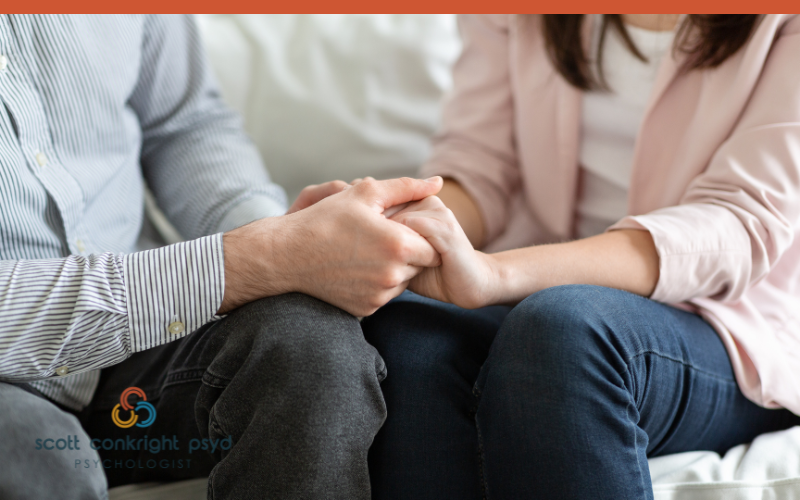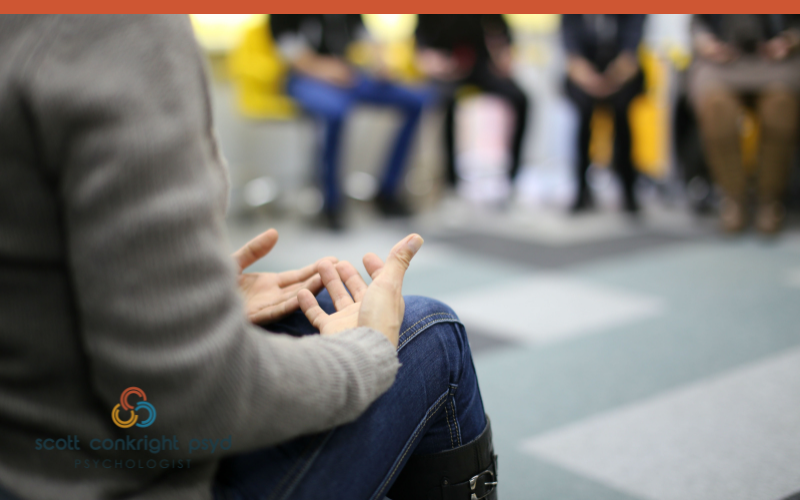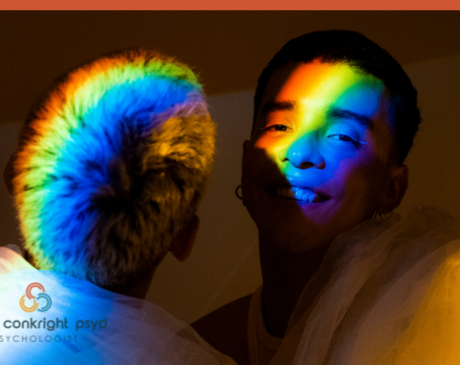Is Couples Group Therapy Right for You? A Guide to Strengthening Your Relationship

Hi there, I’m Dr. Scott Conkright. Love and affection are an excellent foundation in relationships, but sometimes, they need extra support to thrive. Couples group therapy has become an increasingly popular option for partners looking to navigate challenges and build a stronger, more fulfilling connection. This guide will help you explore whether couples group therapy could be the key to unlocking your relationship’s full potential.
What is Couples Group Therapy?
Imagine a safe space where several couples, including myself as your guide, come together to discuss and work through their relationship issues. This community of understanding and support, fostered through open communication, activities, and shared experiences, is a key aspect of couples group therapy. It’s a chance to learn not just from your own dynamic but also from the experiences and insights of others facing similar challenges.
Benefits of Couples Group Therapy
There are numerous unique benefits that make couples group therapy a powerful tool for strengthening your relationship. Here are a few key advantages:
- Shared Experiences and Perspectives: You’re not alone! Hearing from other couples facing similar challenges can be incredibly validating. It normalizes your experiences and fosters a sense of solidarity.
- Enhanced Communication Skills: Group discussions provide a unique opportunity to observe how other couples interact and communicate. This can help you learn new communication techniques and improve your ability to express yourself clearly and effectively, empowering you to navigate your relationship with confidence.
- Supportive Community Environment: Being part of a group creates a sense of belonging and support. Couples can offer and receive encouragement, fostering empathy and understanding for themselves and each other.

Signs You Might Benefit from Couples Group Therapy
Let’s delve into some clear signs that couples group therapy could be beneficial for you and your partner:
- Ongoing Communication Issues: Do you feel like you’re constantly misunderstanding each other or struggling to express your emotions effectively? Group therapy can provide tools to improve clarity and understanding in your interactions.
- Trust Issues: Past infidelities or persistent jealousy can create a significant barrier to a healthy relationship. Group therapy offers strategies for rebuilding trust and moving forward with greater security and openness.
- Feeling Disconnected: Emotional distance or a lack of physical intimacy can be signs of a more profound disconnect. Group therapy can help bridge this gap by better understanding each other’s emotional needs.
- Recurrent Conflicts: Finding yourself stuck in repetitive arguments can be draining and unproductive. Group therapy provides a structured environment to address these recurring conflicts and find lasting solutions.
- Desire for Relationship Improvement: Even if your relationship is currently stable, couples group therapy can be a proactive step to maintain and enhance your connection.
It’s important to recognize that couples group therapy isn’t a one-size-fits-all solution. Here are some situations where individual therapy might be a more suitable option:
Recognizing that couples group therapy isn’t a one-size-fits-all solution is essential. Here are some situations where individual therapy might be a more suitable option:
- Severe Emotional or Physical Abuse: In cases of severe abuse, safety, and individualized support are crucial. Group therapy may not be the most appropriate setting to address these issues.
- Deep-Seated Personal Trauma: If personal trauma is a significant factor in your relationship issues, individual therapy can provide more focused exploration and healing.
- Need for Individual Therapy: Some issues may require dedicated one-on-one attention that group therapy cannot provide.

Preparing for Couples Group Therapy
Taking a step towards couples group therapy can feel daunting, but it can be a transformative experience with the proper preparation. Here are some tips to set yourselves up for success:
- Setting Expectations: Understanding what to expect can help ease any anxieties. Be open-minded and willing to participate actively in the process.
- Preparing to Share Personal Experiences: Being ready to share your experiences and listen to others is critical to getting the most out of group therapy.
- Commitment to Active Participation: Engaging fully in sessions and being open to feedback will maximize the benefits you receive from therapy.
What to Expect in a Session
Here’s a glimpse into what a typical couples group therapy session might look like:
- Session Structure: Sessions often begin with a group check-in, followed by discussions and activities to address common relationship challenges.
- Role of the Facilitator: As your therapist, I’ll guide and mediator, ensuring that discussions remain productive, respectful, and focused on positive outcomes.
- Group Dynamics and Participation: Group therapy thrives on active participation and mutual respect among members. This creates a safe space for sharing, learning, and supporting one another.
How to Choose the Right Group Therapy
- Evaluating the Therapist’s Qualifications: Ensure the therapist leading the group is qualified and experienced in couples therapy. Look for credentials like Licensed Marriage and Family Therapist (LMFT) or Certified Gottman Therapist.
- Group Size and Composition: Consider the size of the group (typically 4-6 couples) and the mix of participants. Consider whether a smaller group with more focused attention or a larger group with diverse perspectives would better fit you.
- Group Rules and Confidentiality: Understanding the group’s ground rules and the importance of confidentiality is essential for feeling comfortable sharing openly and honestly.

Success Stories from Couples Group Therapy
The positive impact of couples group therapy can be truly transformative. Many couples report experiencing:
- Improved Communication: Learning new communication skills and a deeper understanding of each other’s communication styles leads to more transparent and effective interactions.
- Deeper Connection: Sharing experiences and working through challenges can foster a stronger emotional bond and a sense of shared purpose.
- Renewed Commitment: Couples therapy can help reignite the spark and strengthen your commitment to building a happy and fulfilling future together.
Common Challenges in Couples Group Therapy
While couples group therapy offers significant benefits, there can also be some initial challenges:
- Overcoming Initial Reluctance: It’s natural to feel hesitant about sharing personal struggles in a group setting. However, most couples find that the benefits outweigh the initial discomfort.
- Navigating Group Conflicts: Disagreements can arise within the group, but these can be valuable learning opportunities for conflict resolution and developing healthier communication patterns.
- Managing Different Levels of Engagement: Each couple progresses at their own pace. Be patient and focus on your journey while still being open to learning from the experiences of others.
FAQs about Couples Group Therapy
Here are some commonly asked questions about couples group therapy:
- How Long Do Sessions Typically Last? Sessions usually last about 90 minutes to two hours, depending on the group’s needs and the therapist’s approach.
- Is Group Therapy Confidential? Yes, confidentiality is a cornerstone of effective therapy. All participants are expected to respect others’ privacy, ensuring a safe and secure environment for open and honest discussions.
- Can Group Therapy Replace Individual Therapy? Group therapy can complement individual treatment but is not typically a replacement, especially for issues requiring more focused personal attention.
- How Much Does Group Therapy Cost? Costs can vary widely, but many therapists offer sliding scale fees or accept insurance to make therapy accessible.
- What Should We Bring to a Session? Bring an open mind, a willingness to participate, and any relevant materials your therapist recommends.

Unlock the Potential of Your Relationship: How Couples Group Therapy Can Help
Couples group therapy can be a powerful tool for building a stronger, more fulfilling relationship. You can embark on a transformative journey together by considering your needs, exploring the signs that group therapy might be a good fit, and choosing the right group setting. Remember, don’t wait to unlock the full potential of your relationship!
We can develop the tools you need for a stronger, more fulfilling partnership.
For anyone looking to deepen their understanding of these concepts or to start their journey toward a resilient, fulfilling relationship, I’m here to help. I can also connect you with our couples group therapy program in Washington DC, designed to provide a supportive environment for couples to learn and grow together.
Contact Dr. Scott Conkright today to schedule a consultation.
(404) 315-7150
Dr. Scott Conkright SCOTT CONKRIGHT, PSY. D., P.C.



